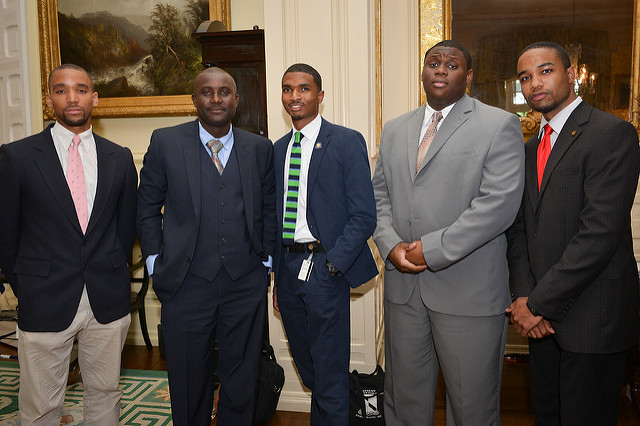Diverse Conversations: Community Colleges, the Backbone of American Higher Education

Every since their inception, community colleges have always been viewed as the step children of higher education. Sure, anyone with a brain knows how significant they are and the important role that they play in America. However, many people can’t see past their perceived lack of “prestige” or “swagger” if you will. Without much acclaim or fanfare, they continue to be the backbone of America’s higher education system. I recently sat down with Dr. Alicia Dowd, associate professor of Higher Education at the University of Southern California, to talk about the importance of community colleges, as well as their problems and issues.
Q: Community colleges are often viewed as the step child of higher education, but they are critically significant. Would you explain why?
A: Community colleges are critically significant for the fact that they enroll about 7 million students; that’s more than half of all undergraduates at public colleges and universities in the United States.
Beyond that, it’s not an overstatement to say that community colleges are an integral part of the national narrative in the United States about the “American Dream.” Sandwiched between high school and four-year colleges and universities, they are an important rung in the ladder of our very stratified society and educational system. We are a “winner take all society”—we love winners, contests, and stories about elites—as the economist Robert Frank has pointed out. And you simply cannot have elites without having lower rungs of the educational ladder.
Community colleges may be viewed as step children by some, but they are the real deal to many who work and study there. And they’re often the one chance a person has for gaining social mobility. The idea that anyone can get ahead by hard work and smarts is important in the American psyche. Never mind that most students who start at a community college don’t finish and don’t end up with a degree or certificate. There’s a chance you’ll make it, it’s relatively cheap (compared to other colleges) and you don’t have to quit your job, move away from home, or be 18 years old to enroll there. Community colleges are a life raft for poor students and students who need a second (or third) chance to get an education or job skills.
Q: Aside from the lack of resources because of budget problems, what other pertinent issues affect community colleges ability to do their jobs?
A: It’s difficult to set aside budget problems, because these are very real. Students are getting turned away for lack of seats, classes are overcrowded, and it can be difficult to complete a degree program if you can’t get the classes you need. Plus if you would like help figuring out the requirements for your degree or to transfer to a four-year university, it can be a long wait. By most estimates, there are more than 1000 students for every counselor, or even as high as 1700 to one, as in the California system, which enrolls over 20% of all community college students today.
But problem-solving with the resources currently available (and continuing to advocate for a fair share of funding), it’s important to recognize that the biggest resource at any college or university are the people who work there. At community colleges, 80 percent of expenditures go towards personnel. With funding cuts, more and more faculty today are part-timers. So one big issue is being sure to give part-time faculty enough hours of teaching at each college so that they can get to know students and be a resource for them.
Plus they need to earn a living wage and receive benefits so they can feel good about teaching in these colleges. It is also important to involve part-time faculty in developing new instructional delivery models and curricula. There’s a lot of demand today for innovation, but one-size-fits all programs are not likely to work very well. Curricular and programmatic changes will need to be tailored by faculty at each college and faculty will want to feel ownership of the program before they commit to its success.
The second issue is that the diversity of the faculty doesn’t match with the diversity of the community college student body. When colleges hire they should be sure to recruit a diverse pool of eligible applicants and increase faculty diversity. Faculty demographics need to catch up with the student demographics. California, Texas, Florida, and New York have such large community college systems that they enroll over a third of all community college students in the U.S. These states also have large Latino populations and many of the colleges have been designated, based on their enrollment, as Hispanic Serving Institutions (HSIs). But the number of Latino faculty is still very small and colleges haven’t been intentional about developing their Hispanic serving identity, for example through curriculum development.
Finally, some argue that faculty unions and byzantine bureaucracies created by shared governance are major impediments to the types of innovations that are needed to do more with less in these times of budget cuts. There’s something to that, but that’s a smaller part of the problem. Faculty intransigence, such that it exists, reflects the actions of people who feel under siege. They have something valuable to protect—the community college’s unique role as an open access, “democratizing,” college—and they want to be sure to protect it. It’s important to understand their motivations and then really speak to them, as well as the community college role in promoting the public good, when attempting to institute changes.
Q: So despite their significance, community colleges have comparatively low rates of completion. Why is that, and what can be done about it? [Q: Community colleges will need to significantly increase their graduation rates for the Obama’s college completion agenda to succeed. Can they do that while many of them are fraught with severe budget crises?
A: In part it’s because some students who go to community colleges are not interested in completing a degree or certificate or they quickly move on to another institution, where they do complete their studies. Other students test the waters and decide that college is not for them. Others, including the majority who are placed in non-college-credit developmental courses after taking assessment tests, can’t get past certain gatekeeper courses, such as algebra. The students who complete degrees tend to be those who are savvy about enrolling in the right courses, self-directed, resilient, and well supported financially and emotionally by their parents, families or significant others. Even though community colleges have relatively low-cost tuition, finances do matter especially when you consider the impact lost earnings have on a low-income household. Community college students are typically working a lot of hours and of course that slows up their academic progress.
One thing that’s being done is to create more detailed data bases of student academic progress to see which students are truly being lost from community colleges (and higher education more generally) and which are “stopping out” or “swirling” for good reasons, for example taking a higher paying job or taking classes at another college closer to their home. A number of accountability strategies are also emerging, like President Obama’s College Scorecard and college completion agenda, which is backed by major philanthropies such as the Gates and Lumina Foundations, to hold colleges accountable for doing a better job in serving the students who do want to earn degrees and credentials. Redesign of financial aid, matriculation, and transfer policies to “incentivize” highly directed student enrollment behavior is also taking place, at the state, federal, and institutional levels.
Community colleges have been a focus of these initiatives because of their low completion rates. The colleges should use the new, detailed data systems that are being built up in many states to tell their success stories better as wells to identify the gatekeeper courses that are blocking student progress. Those gatekeeper courses are then ripe for reform. These should become the focus of curricular and pedagogical experiments with new course structures and culturally inclusive curricula. College leaders, faculty, and policy makers should acknowledge that faculty will need professional development and the tools for inquiry to engage successfully in these transformative change processes. At the Center for Urban Education at USC, we’ve created the Equity Scorecard to assist colleges in using their data to set equity goals for completion and design action plans to achieve those goals.
Another strategy is to redefine completion in terms of short-term, modularized, or “stacked” credentials that students can build on over a career span of lifelong learning. It might be possible to make progress towards President Obama’s goal for 10 million more graduates through this strategy. But, it would be a shame to over-rely on this approach. The considerable rhetoric that the college completion agenda has created will generate real and equitable change only if it leads to improvements in the quality of education available to all students at community colleges. Beyond the rhetoric, policy makers, funders and college leaders should make resources available for experimenting with new teaching and curricular strategies, learning from successes and failures, and participating in professional networks to evaluate and improve on new ideas.
Q: Many incoming freshman at community colleges end up taking remedial courses that are designed to prepare them for college level work. However, these courses do not count towards graduation and end up putting a band aid on academic deficiencies. What is being done about this problem? What is the role of high schools in reducing the need for remedial college courses?
A: The number one task is to improve schooling in primary and secondary schools. Number two is to vastly improve the capacity of schools and colleges to validly assess student knowledge and academic abilities. Too many assessment and placement tests are unfair and result in inequitable educational opportunities for African American and Latino students, who are disproportionately placed in and lost from remedial courses. Number three is to rethink how we teach adults and young adults who weren’t taught well the first time around. There are quite a few new models of instruction being developed, such as the Carnegie Foundation for Teaching’s Statway and Quantway curricula, various accelerated learning approaches, better curriculum alignment and clear pathways to careers and certificates.
Well, that concludes my interview with Dr. Alicia Dowd. I would like to thank her for taking time out of her busy schedule to speak with us.





